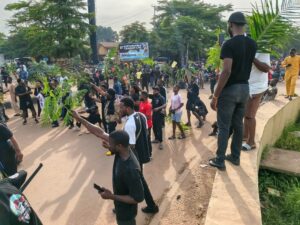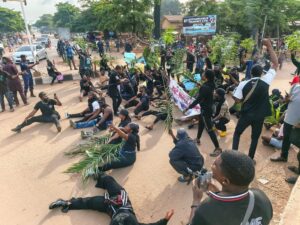The sun barely rose over Makurdi when the first chant echoed down the streets.
 “No more blood on our land!”
“No more blood on our land!”
It began with a handful of university students, eyes burning with anger and grief, their placards shaking in the morning breeze. Among them was Ada, a 22-year-old agricultural science student from Guma, whose uncle had been killed two weeks prior in a night raid on their village.
“We cannot keep mourning in silence,” Ada shouted as they reached the governor’s gate, her voice cracking but defiant. “If the government won’t protect us, the world must hear us!”
What started as a silent march grew into a flood. Youths from Gboko, Logo, and Gwer arrived in buses and motorcycles. Farmers’ sons. Students. Survivors. They held up pictures of burnt homes, of children who would never return to school, of parents buried without justice.

 “We are Benue! We will not be erased!” the crowd roared.
“We are Benue! We will not be erased!” the crowd roared.
Local journalists captured the scenes while drones buzzed overhead. Some held branches dipped in red paint, symbolic of the blood spilled on ancestral land. A few bore bandages—wounds still fresh from fleeing attacks.
Security forces formed a line, but the protest remained peaceful. There were no weapons, just voices, drums, and raw truth.
As dusk approached, Ada stood atop a broken water drum. She read aloud their demands: tighter security for rural communities, investigation and prosecution of attackers, and federal intervention to stop what many feared was becoming ethnic cleansing.
The protest ended with a prayer, not just for the dead, but for peace.
 That night, the images spread across Nigeria and beyond. For once, Benue wasn’t silent. Its youth had risen—not with hate, but with a united cry for justice.
That night, the images spread across Nigeria and beyond. For once, Benue wasn’t silent. Its youth had risen—not with hate, but with a united cry for justice.























